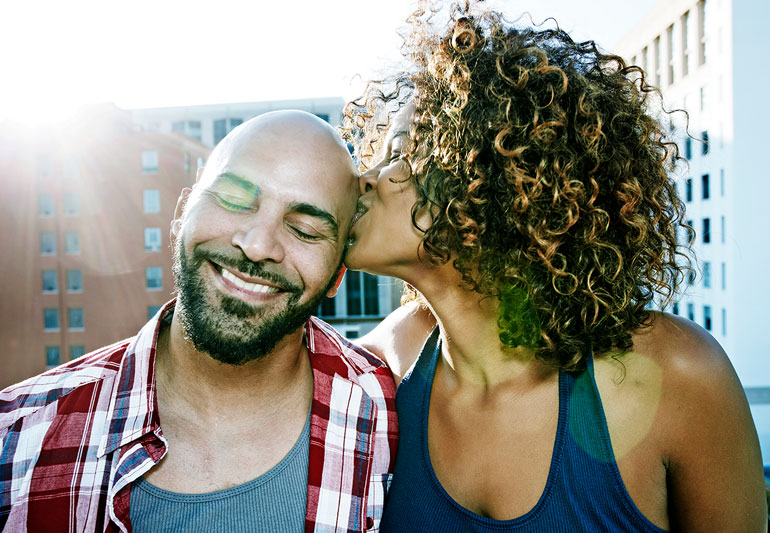

Dating comes with many challenges, especially if you’re battling cancer. No matter what stage you’re in with regard to treatment, it’s normal to have fears and concerns about dating or starting a new relationship. But having cancer doesn’t have to stop you from taking a chance on a great relationship.
Some unique questions
First, understand you’re not alone in wondering how cancer will affect your personal life. According to oncology social worker Christa Poole, MSSA, LISW-S, OSW-C, there are a lot of common questions she sees cancer patients or survivors ask, such as “Should I start to date again? and “How do I tell someone I’m dating that I have cancer?”
It’s also common to hear, “What if my partner doesn’t want to date me because I have cancer?” or “How does cancer affect my mood or my body?”
If you have cancer, these questions not only create worry, but can also keep you from the friendship and companionship that dating provides, Poole says.
“There may be some unique challenges involved with dating when you have cancer,” she says. “While there are a few things someone with cancer may need consider when starting a new relationship, it’s, of course, still very possible to look forward to sharing a loving, caring relationship with someone,” she reassures.
Here are the things that can help you get there.
Cancer affects you physically and emotionally
The unique challenges and struggles individuals with cancer face are real. These may include limited energy, fatigue, pain and emotional sensitivity.
“Expect them, but make sure you’re always mindful that they aren’t the only things that define you,” Poole says.
Seek support
“Finding sources of support is so important and can lead to a great outcome,” Poole says. Team up with your oncologist who can help answer questions and connect you with a social worker.
“There are so many support circles that match up cancer survivors with patients undergoing treatment,” she adds. “Be proactive in exploring what forms of support are available to you.”
Know when you’re ready
Take time to recover from the cancer journey, and remember that the priority has to be you.
Surround yourself with close friends and family, and you will know when you feel ready to date. Be true to your own feelings, and know that they are all okay.
Get out and be social
Try a new activity, hobby or take a fun class. These activities will help you meet new people and get comfortable being social while doing something you enjoy.
Let the things you enjoy be the driving force of your day, Poole says. “You can try a dating app, too, which might help you get out of your shell and feel comfortable getting to know someone first.”
When telling someone you have cancer, be prepared
Take some time and practice what you want to say in advance. Then, determine a good time to share information with the person you’re dating.
“Talking to other cancer survivors for support and advice who have just started dating or are in relationships is an excellent way for you to know what to expect. And it can prepare you for some of the things you might hear from the person you decide to share your journey with,” says Poole.
“Remember, everyone has different levels of strength, emotion and different ways of expressing empathy.”
Be open and stay positive
Don’t automatically think that you’ll be rejected once someone finds out about your cancer.
Remember that although it can be awkward and difficult, being open and honest with your new dating partner can often help relieve stress and anxiety.
“Stay encouraged and keep your faith in other people,” Poole says. “You may be pleasantly surprised if you keep in mind that your cancer is not your only or predominant trait. It’s only a part of who you are, so trust that others know that, too.”
more recommended stories
 Red Blood Cells Improve Glucose Tolerance Under Hypoxia
Red Blood Cells Improve Glucose Tolerance Under HypoxiaKey Takeaways for Clinicians Chronic hypoxia.
 Pediatric Crohn’s Disease Microbial Signature Identified
Pediatric Crohn’s Disease Microbial Signature IdentifiedKey Points at a Glance NYU.
 High-Fat Diets Cause Damage to Metabolic Health
High-Fat Diets Cause Damage to Metabolic HealthKey Points Takeaways High-fat and ketogenic.
 Can Too Many Antioxidants Harm Future Offspring?
Can Too Many Antioxidants Harm Future Offspring?Key Takeaways High-dose antioxidant supplementation in.
 Human Antibody Drug Response Prediction Gets an Upgrade
Human Antibody Drug Response Prediction Gets an UpgradeKey Takeaways A new humanized antibody.
 Dietary Melatonin Linked to Depression Risk: New Study
Dietary Melatonin Linked to Depression Risk: New StudyKey Summary Cross-sectional analysis of 8,320.
 Type 2 Diabetes Risk Identified by Blood Metabolites
Type 2 Diabetes Risk Identified by Blood MetabolitesKey Takeaways (Quick Summary) Researchers identified.
 Microglia Neuroinflammation in Binge Drinking
Microglia Neuroinflammation in Binge DrinkingKey Takeaways (Quick Summary for HCPs).
 Durvalumab in Small Cell Lung Cancer: Survival vs Cost
Durvalumab in Small Cell Lung Cancer: Survival vs CostKey Points at a Glance Durvalumab.
 Rising Chagas Parasite Detected in Borderland Kissing Bugs
Rising Chagas Parasite Detected in Borderland Kissing BugsKey Takeaways (At a Glance) Infection.

Leave a Comment